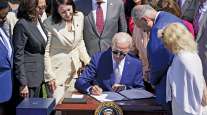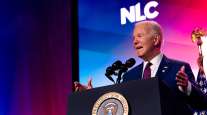Trump Repackages Obama Council as `New' in Infrastructure Plan

The “new council” that President Donald Trump announced on June 9 to streamline regulatory reviews for infrastructure projects isn’t actually new.
After Trump’s speech at the Department of Transportation, the White House confirmed that he was referring to the Federal Permitting Improvement Steering Council, which was authorized by Congress in 2015 and implemented by President Barack Obama. But the panel hasn’t been living up to its potential, said White House spokeswoman Natalie Strom.
“We are setting up a new council to help project managers navigate the bureaucratic maze,” Trump said earlier. “This council will also improve transparency by creating a new online dashboard allowing everyone to easily track major projects through every stage of the approval process.”
That dashboard also was created under the Obama administration and has been online for months.
Trump’s speech capped a week of events aimed at promoting his plan to use $200 billion in federal funds to leverage investment in the nation’s crumbling infrastructure. The efforts to garner support for the initiative have been largely overshadowed by the Senate testimony of fired FBI Director James Comey, who said the president had intimated that he should drop an investigation into former National Security Adviser Michael Flynn.
The Federal Permitting Improvement Steering Council was created as part of the highway bill passed by Congress in December 2015. The panel coordinates the work of different agencies to streamline project reviews and approvals. Richard Kidd IV, whom Obama named to lead the council from July until Trump took office on Jan. 20, previously told Bloomberg News that the new administration should fill his position quickly. An acting executive director filed a report to Congress in April, according to the council’s website.
Trump also said June 9 he would create a new White House office to shepherd specific projects going through environmental reviews and permitting. The idea is similar to something the president called for in an executive order he issued after taking office, and in March, the White House convened a working group of federal agencies to target policies, regulations and statutes.
Trump’s Week
With Washington focused on Comey’s testimony, the administration had declared the week of June 5 “infrastructure week.” Besides the June 9 event, he endorsed turning the U.S. air-traffic control system over to a private, nonprofit corporation, gave a speech in Ohio on June 7 and invited governors and mayors to the White House on June 8 for a “listening session.’’
But the administration didn’t release many more specifics during the week of June 5 about how it plans to fund $200 billion in direct federal spending over 10 years to leverage at least $800 billion in spending by states, localities and the private sector with incentives and other inducements.
The White House posted a fact sheet on June 8 showing that of the $200 billion in federal spending, $25 billion would go for rural infrastructure, $15 billion for “transformative projects” and $100 billion for “local prioritization of infrastructure needs.” It offered no other details, including plans for the remaining $60 billion, but said the numbers are preliminary and subject to negotiation.
Trump is calling on Democrats to join Republicans in supporting an infrastructure plan, and Vice President Mike Pence told governors and mayors on June 8 that "rebuilding America is a bipartisan enterprise." But Democrats have been openly hostile to the outline of Trump’s plan.
‘Bridge to Nowhere’
Of the eight governors and nine mayors on the list of attendees at the June 8 listening session, only one — Columbus Mayor Andrew Ginther — was a Democrat. Senate Democratic Leader Chuck Schumer, who once talked about working with Trump, now calls the plan a “bridge to nowhere.’’
There has been bipartisan support for the idea of reducing the bureaucracy in environmental reviews and permitting that slows down and even scuttles projects.
“If you said to a state, ‘Hey, instead of a dollar of federal funding with all the regulations that come with it, we’ll give you 80 cents, which would you take?’ the states would all take the 80 cents and skip the regulations because they could get projects done better, faster for our citizens,’’ North Dakota Gov. Doug Burgum, a Republican, told reporters at the White House on June 8.
Lengthy Reviews
During an April 4 event with chief executives in Washington, DJ Gribbin, special assistant to the president for infrastructure policy, showed a large flow chart detailing what can be a 10- to 20-year process to get approvals for a federal highway with hundreds of permits from 17 agencies.
That chart was displayed at the June 9 event at the Department of Transportation, and at one point, Trump picked up binders on the stage that were part of what he said were 70 pounds of an environmental report costing $29 million for an 18-mile Maryland road project.
“This massive permit reform — and that’s what it is, it’s a permit reform — doesn’t sound glamorous,” Trump said. “They won’t write stories about it, they won’t even talk about it, but it’s so important.’’
Speeding up reviews and permits is particularly important for private-sector investors, who have available capital but lack enough projects and certainty about deals, Transportation Secretary Elaine Chao has said.
Even so, the past three presidents also focused on streamlining reviews, and it’s unclear how much more can be done to accelerate approvals without changing the standards for review, and the federal government can’t control state and local approvals when they are needed for projects, officials have said.
Democrats have urged the administration to focus on the streamlining provisions that already have been approved but not yet fully implemented and said the problem is really a lack of direct federal spending for projects.
"We cannot streamline our way out of a funding shortfall," Oregon Rep. Peter DeFazio, the top Democrat on the House Transportation and Infrastructure Committee, and Del. Eleanor Holmes Norton, the ranking member on the subcommittee on highways, wrote to Chao in April.




